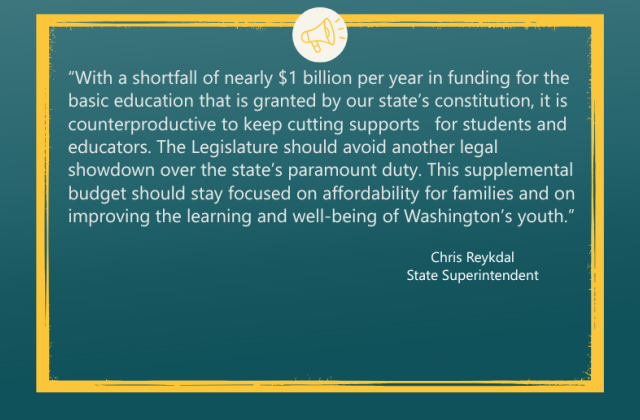Media Contact
Katy Payne she/her
360-764-0201
Editor’s Note: OSPI aims to elevate the authentic experiences of the students in Washington’s K–12 public schools. This story was written by a Washington state high school student participating in OSPI’s Student Stories Program. The author’s opinions, beliefs, and viewpoints do not necessarily reflect those of OSPI, and publication of this story does not constitute OSPI’s approval or endorsement of its contents. With questions, please contact OSPI’s Communications team at commteam@k12.wa.us.
Advanced placement (AP) classes are courses a student may enroll in which accelerate learning and may count as college credit. Other advanced learning programs, such as International Baccalaureate (IB) and Running Start, are available in some schools. IB is a different sort of diploma and Running Start takes place in local community colleges, while AP happens in the high school. As an AP student, I have felt the stress of both exam registration and exam season. This year, my school has provided me ample resources to assist with the AP process, which is a step in a positive direction that helps AP students school-wide.
AP exams cost around $100 each. For students like me who are taking five exams this year (AP Physics 1, AP Physics C Mechanics, AP Computer Science Principles, AP Calculus AB, and AP Literature and Composition), you can imagine that this price may be hard to swing, especially at a school like mine where 62% of students are identified as low income, according to the Washington State Report Card.
This year, the AP coordinator at my school came to each class and gave us the resources to get exam fees waived if we were unable to pay but wanted to take the test, ultimately making these college-credit exams more accessible. Without these resources recently provided, I myself wouldn’t be able to take all of my exams. Making AP courses more accessible will heighten the rate of academically excelling students as they do not need to worry about the cost associated.
My school has fewer AP courses available to us than the other high school in our district. Two of the five AP courses I’m taking this year are AP Calculus AB and AP Physics 1, algebra-based. As someone who plans to major in physics, the fact that the only advanced physics course my school offered is the one I’m taking came as a bit of a disappointment since other schools nearby go up to AP Physics C Electromagnetism, calculus-based.
To bridge this gap for me and other students who have taken or are taking calculus, the physics teacher at my school opened up an assisted self-study AP Physics C Mechanics, calculus-based, course in the AP classroom. By being given the opportunity to take this exam, I will stand out more on my transcript and will be able to practice my passion for physics at a higher level. AP courses are weighted on our school transcript, bringing up our GPA and even allowing us to have higher than a 4.0. Secondly, if you score a 3 or above on an AP exam, college credit is offered at certain schools and you may skip general education courses you’d usually take as a freshman in college.
Other courses, such as macro- and microeconomics, are offered at other schools in my district, and I hold out hope that my school is able to offer these courses in the near future. Giving students a wider and more advanced variety of classes instills a drive for success and allows for early learning in career-based interests.
My experience in the AP realm has far improved since last year, when none of these resources were available to me. I’d like to see the system improve an even greater amount for the next generation of AP learners and I am proud and appreciative of the teachers, proctors, and coordinators who have made exams more accessible and provided more opportunity.
About the Author
Trillium Keith (she/her) is in her senior year of high school in the Mukilteo School District. She is an aspiring aeronautical physicist and plans to move to Scotland for university! In her free time, you can find Trillium reading, building robots, and going to see local bands.









